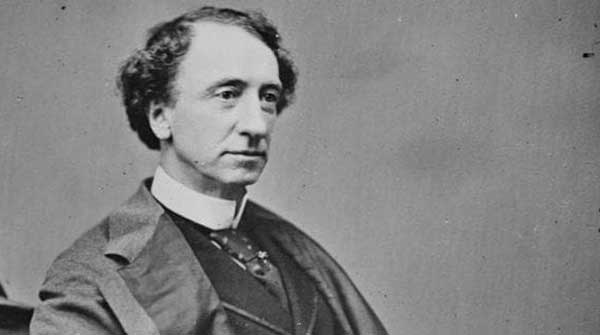His policies towards Indigenous populations earned him their praise but criticism of being too lenient from the Liberal opposition
 Not many of us are aware that January 11, just passed, is officially known as Sir John A. Macdonald Day, as decreed by Parliament in an act of March 21, 2002. On that long-ago date, Sir John was considered a Canadian hero worthy of celebration and commemoration, but now, of course, the wisest minds of our nation tell us otherwise. Macdonald is a despised and disgraced figure. His name is removed from places, buildings, and prizes; his statues are torn down and defaced; mothers frighten their children with stories of the Ogre of Ottawa.
Not many of us are aware that January 11, just passed, is officially known as Sir John A. Macdonald Day, as decreed by Parliament in an act of March 21, 2002. On that long-ago date, Sir John was considered a Canadian hero worthy of celebration and commemoration, but now, of course, the wisest minds of our nation tell us otherwise. Macdonald is a despised and disgraced figure. His name is removed from places, buildings, and prizes; his statues are torn down and defaced; mothers frighten their children with stories of the Ogre of Ottawa.
On the occasion of his birthday, it may do readers some good to be reminded of why John A once had a shining reputation.
Let’s begin with his creation of an independent Canada out of a disparate collection of North American colonies. In the face of an expansive United States, French-Canadians worried about Anglophone domination, and a Britain looking to shed the financial burdens of some of its nonprofitable dependencies, Macdonald persuaded politicians from Ontario, Quebec, Nova Scotia and New Brunswick that a federal union was the best way forward. A confederation would preserve them from being swallowed up by the U.S., preserve provincial rights, and allow the French culture to be protected.
 |
| Related Stories |
| John A Macdonald was a passionate advocate for Indigenous rights
|
| Sir John A Macdonald and the fog of cancel culture
|
| Criticizing Macdonald is fair game but leave statues alone
|
This new nation was the first of its kind: a self-governing dominion based on English common law and the British parliamentary system. Considering how many failed states have come and gone since 1867 – empires in Europe, Africa, and Asia, fascist dictatorships, emirates, soviets, communes, caliphates, kingdoms, sultanates, and “people’s” republics – you must give Macdonald and his colleagues full marks for a successful and stable creation.
In addition, Macdonald expanded this union of four provinces into the second-largest country in the world. Negotiating with the British government, native tribes, regional authorities, and the Hudson’s Bay Company, he made Canada a continent-wide nation linked by a railway from the Atlantic to the Pacific.
It is essential to note that this expansion westward and northward was accomplished with the minimum of violence, unlike in the U.S., where the doctrine of Manifest Destiny produced decades of war with aboriginal inhabitants and a trail of broken treaties. Aside from an ill-advised uprising led by a mad prophet in 1885, the settlement of the Canadian West was brought about by mutually agreeable treaties.
Sir John A. Macdonald’s treatment of prairie natives received much criticism from the Liberal opposition of the time, which claimed that he was spending too much money on emergency food relief in the wake of the disappearance of the buffalo economy. Liberals also complained that native reserves were on good farmland that should have been given to white settlers. They were also upset that the Northwest Mounted Police, established by Macdonald to bring law to western Canada, were too even-handed in their treatment of Aboriginals.
But Sir John A. Macdonald’s policies won him the gratitude of the tribes. They were especially grateful for his smallpox vaccination program, which, in the words of a recent historian, made him the saviour of more indigenous lives than any other prime minister.
Though public opinion is now negative towards Sir John A. Macdonald, it may be truly said of him that there was never “a man who has given more of his time, more of his heart, more of his wealth, or more of his intellect and power for the good of this Dominion of Canada.”
Gerry Bowler is a historian and Senior Fellow at the Frontier Centre for Public Policy.
For interview requests, click here.
The opinions expressed by our columnists and contributors are theirs alone and do not inherently or expressly reflect the views of our publication.
© Troy Media
Troy Media is an editorial content provider to media outlets and its own hosted community news outlets across Canada.

